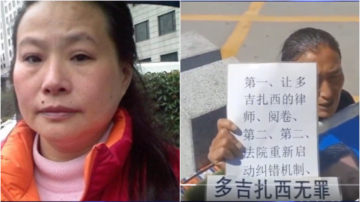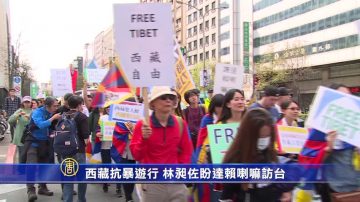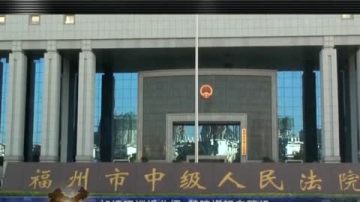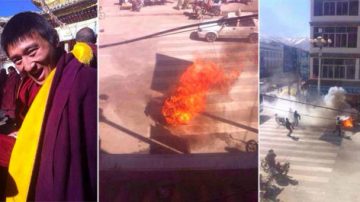【新唐人2012年1月28日訊】2012年剛過去不到一個月,大陸四川藏區已陸續發生多起軍警暴力鎮壓藏民的事件,傳出至少有12藏民死亡。有網友爆料,中央政治局常委、政法委書記周永康26號在甘孜康定,親自指揮對藏胞的鎮壓。而人權組織「人權觀察」近日發佈的人權報告, 批評中共在藏區的人權壓制,也引起官媒激烈反彈。
據報導,四川甘孜已經被當局封鎖,網路和電話被切斷。同時,當局向當地派駐大批警力,民眾被限制自由出行。眾多網友在通往藏區的路上看到大量武警車隊、軍車、裝甲車、防暴車等,成都、德陽、綿陽的武警、特警都出動支援。
《法新社》記者的車輛在離爐霍三百公裡的路上被警方攔截。而離爐霍六百公裡的成都藏區,警方也加強了戒備,三步一崗,五部一哨,《法新社》記者一到藏區就立即被十多名警察圍住,並被告知禁止拍照,禁止採訪。
另外,拉薩網友報料,拉薩接近戒嚴,軍隊在布達拉宮門口集結。藏胞被警告,房頂若不插中共國旗要罰款600元。
與此同時,總部位於美國紐約的非政府組織「人權觀察」,1月22號發表了審查全球人權狀況的《全球年度報告(2012年)》。照例,它對包括中國在內的90多個國家和地區的人權狀況進行了分析。
而中共喉舌《人民日報》26號立即跟進反駁。
《人民日報》駁斥美國「人權觀察」組織是「有選擇的開展工作,採取雙重標準,缺乏政治中立,而且用人失察,方法有失嚴謹。」等。並且要求這個組織「對自己也應該有一個清楚的觀察」。
武漢《中國人權觀察》通訊創辦人秦永敏向《新唐人》表示,「人權觀察」的年度報告內容與《人民日報》談「人權觀察」的情況是兩件事,不應該混在一起。
《中國人權觀察》通訊創辦人秦永敏:「關於人權觀察或其他NGO是不是存在這樣一些問題,這是兩碼事情,和人權組織他們批評別人的錯誤、指出別人的問題,是兩碼事情。那麼對人權組織本身存在的問題,我們當然…社會輿論也應該進行監督和批評。《人民日報》作為一個政府機構,去批評美國的人權組織,它是不是也像美國的人權組織一樣,批評自己的政府呢?」
另外,「四川大學」西部開發研究院教授楊明洪,也撰文反駁「人權觀察」的報告。《報告》指責中共政權把所有牧民和遊牧民遷至他處的作法違反人權,而楊明洪反駁說,西藏當局將當地80%以上的農牧民遷入固定的住房,是所謂「改善農牧民群眾居住條件」。
出版歷史專著《1959:拉薩》的美國華裔學者李江琳,從2004年開始致力於西藏問題研究。她表示,西藏牧民被中共的「安居工程」定居下來之後,失去了自己的生活方式,她懷疑有多少藏民是自願「被安居」的?
西藏問題專家李江琳:「藏人也告訴我,離開了草原、離開了他的神山、離開了他的聖湖,他就失去了他的靈魂,這是一個很悲哀的事情。但是對這些牧民的生計應該怎麼辦...可是我也不認為,強行讓牧民定居之後,定居在一個他們並不想要去的地方,這並不是一個辦法。」
秦永敏也表示,中共強姦了西藏的傳統文化。
秦永敏:「當局還經常對他們的藏族人民,包括那些喇嘛們搞政治學習,對他們進行洗腦,這樣的話,他們就會覺得,自己原有的文化傳統不僅被中斷了,而且被強姦了,在這種情況下,他會感到幸福?還是會感到痛苦呢? 」
秦永敏認為,人權組織是社會的良心,如果沒有他們,很多國家社會的問題就沒辦法發現。他說,人權組織是社會問題的X光機。
新唐人記者常春、周平、孫寧採訪報導。
Deterioration in Sichuan Tibetan Human Rights
Less than a month into 2012, and incidents of violent police
suppression of Tibetans have been reported in Sichuan.
The incidents have caused at least 12 death.
A netizen reports that, on Jan 26, Politburo Standing
Committee member Zhou Yongkang personally led the persecution of Tibetans in Garzê.
At the same time, CCP media People’s Daily wrote articles
to refute reports by Human Rights Watch.
According to reports, the Garzê region in Sichuan has
already been blockaded by the regime.
Internet and phone lines have all been cut off.
At the same time, the regime sent large number of police
to restrict citizens from traveling.
Lot’s of netizens reported seeing large number of police
cars, military cars, armored vehicles and anti-riot vehicles.
Armed police and special police from Chengdu, Deyang
and Mianyang were also sent.
An AFP reporter’s car was intercepted on a highway 300 km
from Luhuo.
In Chengdu Tibetan region 600km from Luhuo, police also
increased security levels, with everywhere full of police posts.
An AFP reporter in the Tibetan region was surrounded by
over police.
They were told photography and interviews are prohibited.
In addition, a Lhasa netizen wrote that Lhasa is almost near
martial law; military is assembled in front of Potala Palace.
Tibetans were warned, those without Chinese flag on their
roof will be fined 600 yuan.
At the same time, Human Rights Watch (HRW) in New York
published it’s World Report 2012 on Jan 22.
It is a review of human rights around the world.
The report analyzed human rights conditions in over 90
countries, including mainland China.
However, the Chinese regime’s media People’s Daily
refuted the Human Rights’ Watch report on Jan 26.
The People’s Daily accused Human Rights Watch of being
an organization that, “conducts selectively work.
It uses double standards, lacks political neutrality, lacks
personnel oversight, and uses erroneous methods.”
It furthers that, “(Human Rights Watch) should get a clear
watch over itself.”
The founder of Chinese Human Rights Watch, Qin Yongmin
from Wuhan, spoke to NTD.
The Human Rights Watch annual report, and those accusing
Human Rights Watch are separate issues. These issues shouldn’t be mixed.
Qin Yongmin, “Regarding whether Human Rights Watch
and other NGOs have internal issues, this is separate.
It’s different from these organizations pointing out issues.
Regarding internal issues of the human rights organization,
we...society should supervise and criticize.
The People’s Daily is a government entity criticizing an
American human rights organization.
But does it criticize it’s own government like an American
human rights organizations?”
Yang Minghong, Sichuan University Professor at Western
Development Research Institute also refuted the HRW report.
Human Rights’s Watch criticized that the Chinese regime
forcing Tibetans to relocate is violating human rights.
Yang claims that relocating over 80% of Tibetans into stable
living conditions, is “improving living conditions of herders.”
He wrote, “how can the Human Rights Watch accuse the
welcomed 『stable living project’ as violating human rights?”
Li Jianglin, a Chinese-American scholar and author of
“1959 Lhasa” has studied the Tibet issue since 2004.
She expressed, Tibetan herders lost their way of living after
being relocated to a fixed house.
How many Tibetans would choose that?
Li Jianglin, “Tibetans told me, leaving the grassland, their
sacred mountain, their holy lake, they lost their spirit.
This is a very sad thing.
Regarding their livelihood, I think forcing them to relocate
to the place they don’t want to be, that’s not a solution.“
Qin Yongmin expressed, the Chinese regime ruined Tibet’s
traditional culture.
Qin Yongmin, “The regime frequently force the Tibetan
people, those monks to study politics, to brainwash them.
This makes them feel that their traditional culture is not only
cut off, but has been raped.
In such conditions, would they feel happy? or extremely
painful?”
Qin Yongmin believes, human rights organizations are the
conscience of society.
Without them, many national and social problems can not
be discovered.
Human rights organizations are like X-Ray machines
for social conflicts.
NTD Reporters Chang Chun, Zhou Ping and Sun Ning
據報導,四川甘孜已經被當局封鎖,網路和電話被切斷。同時,當局向當地派駐大批警力,民眾被限制自由出行。眾多網友在通往藏區的路上看到大量武警車隊、軍車、裝甲車、防暴車等,成都、德陽、綿陽的武警、特警都出動支援。
《法新社》記者的車輛在離爐霍三百公裡的路上被警方攔截。而離爐霍六百公裡的成都藏區,警方也加強了戒備,三步一崗,五部一哨,《法新社》記者一到藏區就立即被十多名警察圍住,並被告知禁止拍照,禁止採訪。
另外,拉薩網友報料,拉薩接近戒嚴,軍隊在布達拉宮門口集結。藏胞被警告,房頂若不插中共國旗要罰款600元。
與此同時,總部位於美國紐約的非政府組織「人權觀察」,1月22號發表了審查全球人權狀況的《全球年度報告(2012年)》。照例,它對包括中國在內的90多個國家和地區的人權狀況進行了分析。
而中共喉舌《人民日報》26號立即跟進反駁。
《人民日報》駁斥美國「人權觀察」組織是「有選擇的開展工作,採取雙重標準,缺乏政治中立,而且用人失察,方法有失嚴謹。」等。並且要求這個組織「對自己也應該有一個清楚的觀察」。
武漢《中國人權觀察》通訊創辦人秦永敏向《新唐人》表示,「人權觀察」的年度報告內容與《人民日報》談「人權觀察」的情況是兩件事,不應該混在一起。
《中國人權觀察》通訊創辦人秦永敏:「關於人權觀察或其他NGO是不是存在這樣一些問題,這是兩碼事情,和人權組織他們批評別人的錯誤、指出別人的問題,是兩碼事情。那麼對人權組織本身存在的問題,我們當然…社會輿論也應該進行監督和批評。《人民日報》作為一個政府機構,去批評美國的人權組織,它是不是也像美國的人權組織一樣,批評自己的政府呢?」
另外,「四川大學」西部開發研究院教授楊明洪,也撰文反駁「人權觀察」的報告。《報告》指責中共政權把所有牧民和遊牧民遷至他處的作法違反人權,而楊明洪反駁說,西藏當局將當地80%以上的農牧民遷入固定的住房,是所謂「改善農牧民群眾居住條件」。
出版歷史專著《1959:拉薩》的美國華裔學者李江琳,從2004年開始致力於西藏問題研究。她表示,西藏牧民被中共的「安居工程」定居下來之後,失去了自己的生活方式,她懷疑有多少藏民是自願「被安居」的?
西藏問題專家李江琳:「藏人也告訴我,離開了草原、離開了他的神山、離開了他的聖湖,他就失去了他的靈魂,這是一個很悲哀的事情。但是對這些牧民的生計應該怎麼辦...可是我也不認為,強行讓牧民定居之後,定居在一個他們並不想要去的地方,這並不是一個辦法。」
秦永敏也表示,中共強姦了西藏的傳統文化。
秦永敏:「當局還經常對他們的藏族人民,包括那些喇嘛們搞政治學習,對他們進行洗腦,這樣的話,他們就會覺得,自己原有的文化傳統不僅被中斷了,而且被強姦了,在這種情況下,他會感到幸福?還是會感到痛苦呢? 」
秦永敏認為,人權組織是社會的良心,如果沒有他們,很多國家社會的問題就沒辦法發現。他說,人權組織是社會問題的X光機。
新唐人記者常春、周平、孫寧採訪報導。
Deterioration in Sichuan Tibetan Human Rights
Less than a month into 2012, and incidents of violent police
suppression of Tibetans have been reported in Sichuan.
The incidents have caused at least 12 death.
A netizen reports that, on Jan 26, Politburo Standing
Committee member Zhou Yongkang personally led the persecution of Tibetans in Garzê.
At the same time, CCP media People’s Daily wrote articles
to refute reports by Human Rights Watch.
According to reports, the Garzê region in Sichuan has
already been blockaded by the regime.
Internet and phone lines have all been cut off.
At the same time, the regime sent large number of police
to restrict citizens from traveling.
Lot’s of netizens reported seeing large number of police
cars, military cars, armored vehicles and anti-riot vehicles.
Armed police and special police from Chengdu, Deyang
and Mianyang were also sent.
An AFP reporter’s car was intercepted on a highway 300 km
from Luhuo.
In Chengdu Tibetan region 600km from Luhuo, police also
increased security levels, with everywhere full of police posts.
An AFP reporter in the Tibetan region was surrounded by
over police.
They were told photography and interviews are prohibited.
In addition, a Lhasa netizen wrote that Lhasa is almost near
martial law; military is assembled in front of Potala Palace.
Tibetans were warned, those without Chinese flag on their
roof will be fined 600 yuan.
At the same time, Human Rights Watch (HRW) in New York
published it’s World Report 2012 on Jan 22.
It is a review of human rights around the world.
The report analyzed human rights conditions in over 90
countries, including mainland China.
However, the Chinese regime’s media People’s Daily
refuted the Human Rights’ Watch report on Jan 26.
The People’s Daily accused Human Rights Watch of being
an organization that, “conducts selectively work.
It uses double standards, lacks political neutrality, lacks
personnel oversight, and uses erroneous methods.”
It furthers that, “(Human Rights Watch) should get a clear
watch over itself.”
The founder of Chinese Human Rights Watch, Qin Yongmin
from Wuhan, spoke to NTD.
The Human Rights Watch annual report, and those accusing
Human Rights Watch are separate issues. These issues shouldn’t be mixed.
Qin Yongmin, “Regarding whether Human Rights Watch
and other NGOs have internal issues, this is separate.
It’s different from these organizations pointing out issues.
Regarding internal issues of the human rights organization,
we...society should supervise and criticize.
The People’s Daily is a government entity criticizing an
American human rights organization.
But does it criticize it’s own government like an American
human rights organizations?”
Yang Minghong, Sichuan University Professor at Western
Development Research Institute also refuted the HRW report.
Human Rights’s Watch criticized that the Chinese regime
forcing Tibetans to relocate is violating human rights.
Yang claims that relocating over 80% of Tibetans into stable
living conditions, is “improving living conditions of herders.”
He wrote, “how can the Human Rights Watch accuse the
welcomed 『stable living project’ as violating human rights?”
Li Jianglin, a Chinese-American scholar and author of
“1959 Lhasa” has studied the Tibet issue since 2004.
She expressed, Tibetan herders lost their way of living after
being relocated to a fixed house.
How many Tibetans would choose that?
Li Jianglin, “Tibetans told me, leaving the grassland, their
sacred mountain, their holy lake, they lost their spirit.
This is a very sad thing.
Regarding their livelihood, I think forcing them to relocate
to the place they don’t want to be, that’s not a solution.“
Qin Yongmin expressed, the Chinese regime ruined Tibet’s
traditional culture.
Qin Yongmin, “The regime frequently force the Tibetan
people, those monks to study politics, to brainwash them.
This makes them feel that their traditional culture is not only
cut off, but has been raped.
In such conditions, would they feel happy? or extremely
painful?”
Qin Yongmin believes, human rights organizations are the
conscience of society.
Without them, many national and social problems can not
be discovered.
Human rights organizations are like X-Ray machines
for social conflicts.
NTD Reporters Chang Chun, Zhou Ping and Sun Ning




